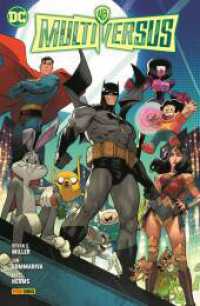- ホーム
- > 洋書
- > 英文書
- > Cinema / Film
Full Description
This collection of essays explores intermediality as a new perspective in the interpretation of the cinemas that have emerged after the collapse of the former Eastern bloc.
As an aesthetic based on a productive interaction of media and highlighting cinema's relationship with the other arts, intermediality always implies a state of in-betweenness which is capable of registering tensions and ambivalences that go beyond the realm of media. The comparative analyses of films from Hungary, Romania, Poland, the Czech Republic, Bosnia and Herzegovina and Russia demonstrate that intermediality can be employed in this way as a form of introspection dealing with complex issues of art and society.
Appearing in a variety of sensuous or intellectual modes, intermediality can become an effective poetic strategy to communicate how the cultures of the region are caught in-between East and West, past and present, emotional turmoil and more detached self-awareness. The diverse theoretical approaches that unravel this in-betweenness contribute to the understanding of intermedial phenomena in contemporary cinema as a whole.
Contents
Ágnes Pethő: The Art of In-Betweenness in Contemporary Eastern European Cinema
Entangled Sensations, Cinema in-between the Arts
1. Hajnal Király: Intermedially Emotional. Musical Mood-Cues, Disembodied Feelings in Contemporary Hungarian Melodramas
2. Judit Pieldner: Black-and-White Sensations of History and Female Identity in Contemporary Polish and Czech Cinema
3. Ágnes Pethő: Sculpture and Affect in Cinema's Expanded Field. From Aleksey Gherman Sr.'s Hard to be a God to Aleksey Gherman Jr.'s Under Electric Clouds
4. Mareike Sera: Intermedial Densities in the Work of Jan Švankmajer. A Media-Anthropological Case Study
Immersions into Memory, Culture and Intermediality
5. Christina Stojanova: Trickster Narratives and Carnivalesque Intermediality in Contemporary Romanian Cinema
6. Melinda Blos-Jáni: Photographic Passages to the Past in Eastern-European Nonfiction Films
7. Katalin Sándor: Trauma, Memorialization and Intermediality in Jasmila Žbanić's For Those Who Can Tell No Tales
8. Fatima Chinita: An Immersive Theatrical Journey through Media and Time in Alexander Sokurov's Russian Ark
Reflections upon Reality, Representation and Power
9. Malgorzata Bugaj: The Real and the Intermedial in Alexander Sokurov's Family Trilogy
10. Zsolt Gyenge: This is Not Magritte. Corneliu Porumboiu's Theory of Representation
11. Gabriel Laverdière: Digital Détrompe l'Oeil and Contemporary Polish Narrative Cinema
12. Bence Kránicz: False Gods. Superhero Genre and Graphic Storytelling in Contemporary Hungarian and Russian Cinema








